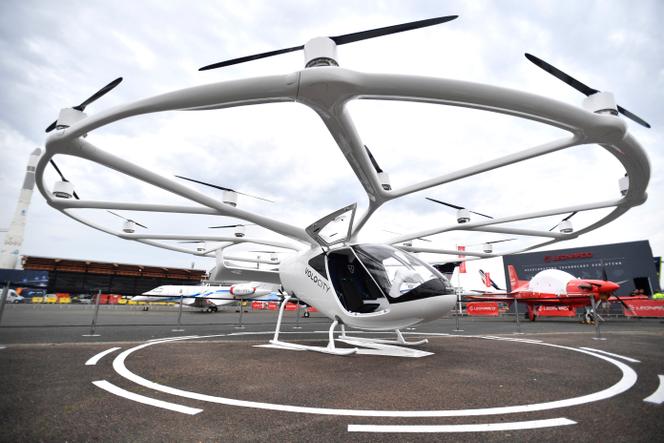


On Wednesday, June 12, just a few weeks before the opening of the Paris Olympic and Paralympic Games, the first flying cabs to operate in France were given the go-ahead to carry out experimental flights in the Paris region during the Olympics. And this despite several unfavorable opinions from the authorities. Commercial use has remained out of the question. Transportation Minister Patrice Vergriete has only "authorized an experiment," said a nonetheless pleased Edward Arkwright, deputy CEO of Groupe ADP, which has been leading the venture.
For the past few days, and at breakneck speed, the airport operator has been installing a vertiport on a barge anchored just a stone's throw from the Gare d'Austerlitz train station and at the foot of the Cité du Design et de la Mode, in Paris's 13th arrondissement. It is intended to house the German manufacturer Volocopter's futuristic-looking machines, which appear to be half-drone, half-helicopter. During the Paris Games, they're only expected to make "a few flights," said ADP's No. 2. In practice, each flying cab will carry just two people, a pilot and a passenger.
For the airport operator, this test phase will be limited in time, as "the barge will have to be dismantled by December 31, 2024 at the latest," said Arkwright. The Austerlitz demonstration site will not be the only point of departure for the aircraft. The VTOL (Vertical Take-Off and Landing) aircraft will also take off from four other vertiports, at Saint-Cyr-l'Ecole, the Issy-les-Moulineaux heliport and two airports: Le Bourget and Roissy-Charles de Gaulle. Thanks to the Austerlitz vertiport, flying cabs will be able to enter Paris without passing over any dwellings, but only by flying over the Seine.
Volocopter's VTOLs have not yet been certified for commercial operation. Nevertheless, this trial represents a victory for Groupe ADP and its partners − in this case, the RATP public transport company, the Ile-de-France (Paris) region and the French Civil Aviation Authority.
The promoters of the venture had to surmount a number of obstacles. In the end, the least among these was from the European Aviation Safety Agency (EASA). The EASA imposed certification standards on VTOLs that were as stringent as those for commercial airliners. A flying cab developed by American manufacturer Joby crashed in California in February 2022. It was different, however, from those in Paris in that it had no navigator and was piloted remotely.
In addition to technical constraints, the flying cab project was eventually able to overcome numerous administrative and political hurdles thanks to ministerial authorization. In September 2023, the French Environmental Authority issued an unfavorable opinion on the operation of flying cabs during the Olympic Games. In its view, the impact study for the Austerlitz vertiport was "incomplete." The agency judged the aircraft to be insufficiently economical in terms of electricity consumption, and too noisy to take off and land on a barge anchored in the capital. Paris City Hall was also strongly opposed to the VTOLs. The Paris Council had, in November 2023, issued a negative opinion, calling the project "absurd" and "an environmental aberration."
You have 31% of this article left to read. The rest is for subscribers only.
